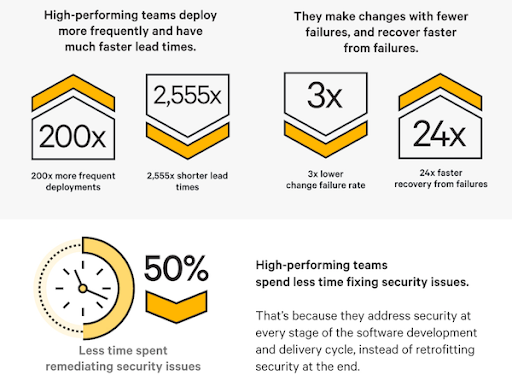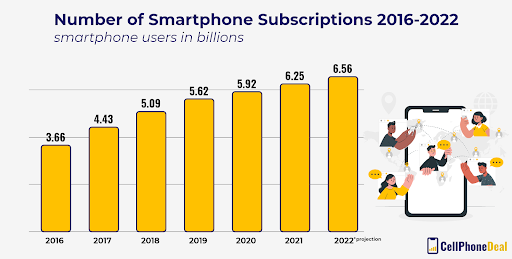Essential DevOps Role in Mobile App Development

The human species has been searching for answers ever since its inception. Man has greatly transformed his universe with no end in sight, beginning with the development of the wheel and continuing with the discovery of sliced bread.
But thanks to quick progress, we moved slowly to lightning-fast in just a decade. Smartphones are currently the primary device used to access the internet, formerly mostly accessed through desktop computers. According to Cisco, global mobile users are expanding 2 times more quickly than the world’s population. As a result, businesses sprang into action to develop apps that would appeal to people to meet growing demand.
Highlights
Many crucial components are put on hold as businesses today hurry to release apps and make an impression in their industries. Unfortunately, these components can only be considered briefly because they are essential to the app’s long-term success. They include, among other things, app security, code quality, and development costs. An innovative and novel strategy known as DevOps was developed to address these issues.
DevOps has been around for a long time, but back then, concerns like cost, the time required for development, and technologies. Instead, utilizing the DevOps methodology enhances team communication and promotes seamless integration.
In reality, the fact that the global market for DevOps is expected to reach USD 14.9 billion by 2028 motivates many entrepreneurs to use this approach in developing mobile apps.
In this blog post, we’ll look at the benefits of DevOps for every team building modern mobile applications. Continue reading to find out more about the advantages of the DevOps role in mobile app development, including the meaning and much more.
What is DevOps?
Application development = Dev
Operations = Ops
DevOps role in mobile app development is more accurately thought of as a work culture than a job title or a methodology.
- The term “DevOps,” which combines the terms “development” and “operations,” describes a shared or collaborative approach to the responsibilities carried out by an organization’s application development and IT operations teams.
- Agile software development and DevOps go hand in hand, and Agile inspired some DevOps components.
The combination of cultural philosophies, practices, and tools known as DevOps improves an organization’s capacity to deliver applications and services at high velocity: products evolve and improve more quickly than they would in organizations using conventional software development and infrastructure management processes.
DevOps is a continuous process. Thus, practitioners utilize the infinity loop to illustrate the relationships between the many stages of the DevOps lifecycle. The loop represents the necessity for ongoing communication and iterative development across the whole lifecycle, even though it appears to flow sequentially.

Source: Puppet
You might be surprised to learn that DevOps-using app development organizations have seen a 63% increase in product quality and delivery. App development organizations are eagerly adopting DevOps approaches for this main reason.
The Essential 6 C’s Of the DevOps Cycle
Effective DevOps strategies encourage firms to enhance their entire operations continuously. Therefore, organizations must adopt a continual development philosophy to meet the expectations of workers, clients, or any other end-user.
Customers are fickle and prone to discarding products and services that need to satisfy their wants. We not only expect but also need features that cater to our requirements in our fast-paced, connected world.
A business’s products, processes, and procedures must be updated when the technology in its environment changes to meet customer demand. High productivity, minor bugs, greater communication, improved quality, quicker problem resolution, increased reliability, and better and on-time software delivery are all results of its methods.
Adopting DevOps role in mobile app development involves six elements that tie the whole process and bring fruitful results.
- Continues planning
- Continues testing
- Continues monitoring
- Continuous integration
- Collaborative development
- Customer Feedback
- Continuous Planning is the stage where the project’s team developers, project managers, testers, automation staff, etc., come together and discuss the application’s scope, outcomes, and much more.
- Continues Testing starts with the unit and integration testing that helps increase the efficiency and speed of the development.
- Continued Monitoring is significant for reducing the cost of errors and change. Nagios is the best tool used for continuous monitoring.
- Continuous Integration in DevOps concentrates on frequently error-free builds that must be combined with the last developed code.
- Collaborative Development starts with project planning from scratch. It includes skilled developers, QA, designers, and project managers.
- Customer Feedback allows an immediate response from customers for your product or service, and their feedback helps you modify the product accordingly.
Why is DevOps Becoming a Buzzword?
In 2022, the DevOps software market will generate $6.6 billion, predicts APPDYNAMICS. In 2017, the market was worth $2.9 billion. The following are the factors driving the adoption of DevOps:
- Investments made by businesses in software-driven reform.
- Selecting development approaches that are connected with microservices-based architectures.
- CTOs and CEOs are investing more in implementing operational and collaborative computerized application development procedures.
Role of DevOps in App Development

Source: Cell Phone Deal
In the above image, you can see the number of Smartphone users has surpassed 6 billion and is projected to increase by several hundred million over the next few years.
DevOps is a modern strategy that enables smooth application delivery from the concept stage through production for mobile app development. DevOps removes the barrier between development and operations and is a departure from the traditional waterfall approach to software development.
Integration of developers and system administrators is known as DevOps. They aim to market the application more quickly, affordably, and of higher quality. It’s a common misconception that we can purchase them whenever technology is popular, but we can’t! It doesn’t function like that. The developers must create them on their own.
The following are some benefits that explain why DevOps is crucial in the development of apps:
Deliver Solutions in Less Time
The key to successful DevOps is team collaboration. Mobile DevOps is more than this, in actuality. When operations and development teams work together, organizations can communicate information between teams.
As a result, the period between the design and development stage and the actual release is shortened. As a result, code is deployed more frequently, and new regressions are tested, verified, and released more quickly than in a normal phase-by-phase procedure.
Mobile DevOps provides a quicker way to solve issues. Once the improvements and features for each release have been introduced, continuous integration with the appropriate test configuration offers a quicker resolution to the issues.
Instant Feedback From Customers
Both clients and developers benefit greatly from this because it makes problem-solving quicker for both parties. This keeps everyone on the team informed and enables speedy issue fixes or feature additions. Due to its speedy distribution and detection, instant feedback becomes essential to the app’s smooth operation and improves the user experience.
Zero Chances of Bottlenecks
DevOps promotes improved team communication, a transparent methodology, and better product development. Several bottlenecks are eliminated with DevOps, including
- Inconsistent development process
- Lack of bugs and errors
- Manual testing process
- Poor communication
- Instability in workflow
Establish the Better Work Culture
The stability of the workspace is negatively impacted by the strain required in integrating new features through a mobile app, which eventually results in subpar productivity.
Because of their excellent documentation and openness, DevOps processes are recognized for managing new features better. In addition, with DevOps, the process of developing mobile apps becomes more stable and steady.
Quality Control the Process of Developing Mobile Apps
DevOps may examine the code from the beginning through delivery while taking added fixes into account, which helps to maintain the quality of the software development process.
The ratings and comments received from users must be considered for the apps’ future performance. Therefore, DevOps aids in bug fixes and upgrades for upcoming improvements and alterations.
DevOps is essential for enhancing the software development process. And it must consider the numerous facets of software development while keeping the overall structure in mind. As a result, it contributes to the management of the app’s overall success, efficient collaboration, high-quality monitoring, and software development quality.
Wrapping Up
The advantages of DevOps role in mobile app development are numerous, but one thing is certain: they may make you look like a game-changer. DevOps is a general strategy that works with various application development types, but it might be a suitable option for developing mobile apps. Mobile app DevOps has you covered in all areas of mobile app development, from cost savings to faster growth.
Do you want to adopt DevOps in mobile app development? Get any kind of IT services from us as we help you reap maximum benefits and ensure you unmatched business growth with technology services.



